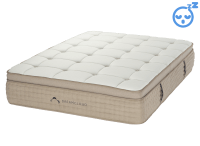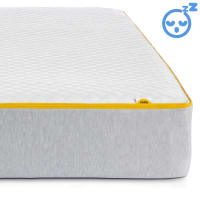Mattress sales: Best discounts and promotions of UK mattresses
Mattress promotions

Is it worth going for a mattress in a sale?
This could sound like a stupid question. For many who are veterans of seasonal sale mattress purchases, it is. However it is worth asking because it could seem that some companies running promotions are offering essentially gold for pennies, in other words offering an opportunity that seems too good to be true and suspicious eyebrows may be raised. Though that is understandable, businesses have numerous, legitimate reasons for having promotions.
Firstly a company may be holding excess stock which doesn't seem to be shifting . As is the shrewd move in any business sector they must identify the reason for that being the case and one of the primary aspects they likely will look at is the price. Once they see the cost is what is keeping customers away it makes sense from their point of view to drop costs and give into consumer stubborness. This is a win-win because the consumers get what they want for the prices they prefer and the company can finally sell their product. This promotion also gives the vendor a better idea of where they fall on the competitive retail pricing scale and it could prompt them to make their prices more competitive. This has been the case with numerous mattress companies who have tweaked their pricing. Therefore, the sales promotions should be there to incentivize instead of discourage. You, as the buyer should feel protected, though, if you want to feel secure that you are absolutely making a saving. The next section offers the assurance that you could be after
New guidelines protects UK consumers
The UK has very strict legal regulations regarding how goods-selling companies advertise their prices. The term ‘price comparison’ covers a lot of areas in how a business must now promote their products. In December 2016 The Chartered Trading Standard institute issued new guidelines which trading entities had no longer than a year to ensure they conformed to. Their guidelines even applied to UK companies that advertised abroad. What these guidelines did was address trading bad practice which were tricking or misleading consumers. When you next see a sale of a mattress or an accessory you can be confident of at least three aspects.
We are looking out for you and the regulators and associations are too
The CTSi or Chartered Trading Standard institute is essentially a business and consumer association for trading and commerce protocol within the UK, actively mediating between buyers and sellers. The ASA or the Advertising Standard agency is the non-statuory, recognized regulatory body of advertising standards in the UK. Alongside the CTSi, they act to promote fair and non-exploitative advertising. This means that advertising companies now have someone looking over their shoulders, ensuring they aren't cheating and this gives the power back to the buyer, you. When you next see a sale of a mattress or an accessory you can be confident of at least three aspects.
Original prices can't be pre-sale price increases
Likely the most common vendor trick of the lot is pretending to offer sales by inflating a product price a few weeks before a promotion, before reducing it to the original price or close to that and labelling this ‘new’ price as the result of a promotion. If we applied simple maths to this, a vendor could be selling their sofas for £150. However three weeks before the seasonal sales arrives, they could shelve the sofas, temporarily taking them out of stock. They then bring them back, perhaps rebrand them a little before raising the price to £195. This is a 30% increase. However it is only at this point that they run advertisements for upcoming sales. They could advertise for 30% off and receive a rush of customers who believe they are receiving bargains, when the promotion time comes round. However consumers will be practically tricked into buying the sofa for what its price was just three weeks prior. Vendors could even improve their profit margins by lowering the discount value, or boosting the pre-sales price, so they recieve more than £150 per sofa.
Initially this could go under the radar, but since the introduction of new guidelines by the CTSi, this is no longer the case.
Now the guidance from the CTSi stipulates that the original price must have been established for at least two months prior to the ‘promotional’ costs with no intervening or temporary prices in between. This means the sales you are getting are real and is and have been regulated to be that way.
The sales promotion must have a cut-off point which makes it a genuine promotion
Since April 2017 companies can longer simply advertise at a higher price, then slash costs in what they call a discounted sales promotion, but have it run for an extensive period of time, such as many months, all the while still calling it a promotion. Tesco was penalised for doing exactly this, where they reduced the price of a particular fruit they were selling for numerous months and made savings claims on it, referring to the original price for comparison. Preventing promotions from running on like this, could appear at first as an attack on the consumer, but it really isn't. If a company holds a new lower price for a very long time, disproportionately longer than the original price had been held in place, then it becomes increasingly clear that what's happening is not really a sales promotion that offers savings to the mattress or mattress accessory buyer. Actually, it's just a price adjustment. At this point reference to an original price is just a sneaky, cunning strategy to make the buyer believe they are recieving a discount when in actuality the vendor doesn't have real intentions of returning to those original prices for long. Traders are now guided by the authority of the CTSi to employ a 1:1 ratio, so if the higher price was established for a month, then the discounted price should be advertised for no longer than a month. Therefore the mattress discounts above have been established as genuine sales promotions with cut-off points. This means you aren't benig deceived. You could actually grab yourself a bargain, so you better get your running gear on because you don't have much time left to cash in on your potential savings.
Promotional claims must apply to set amount of products
Have you ever been enticed by a sales sign with dazzling colours, pasted onto a shop window, which claims in bold letters: ‘Up to 80% off all items in store’. This sign or a similar one you have likely seen would usually have about a hundred exclamation marks after the claim and most likely you felt compelled to enter and check out what you could find. In most cases, you'd wind up dissapointed and frustrated that the cool pair of jewel-set denim jeans with tattoo-like design markings and fashionable tears in the knee area, were only 20% off, so you'd just buy the 80% discounted paint brush set just to make yourself feel like you hadn't been robbed and even though you haven't painted since you were in school. This might be a little too specific, but the point is in this anecdotal circumstance, the signs claim was not a lie. Technically if all items were on sale and even if only one item; that paintbrush set, for example was the only one on an 80% sale then, mathematically it is an axiomatic truth. Yet, you feel like you have been wronged because the item you wanted had a much lower discount tag attached to it. In order to address this problem, the CTSi set the guideline that the discount percentage advertised must apply to at least 10% of the range of items on sale. This puts substance to the word ‘up’ in the ‘Up to 80% off’ claim
Now you can rest easy on your newly purchased mattress with peace of mind that you've saved yourself money from a genuine sales promotion.
Get the sleep you deserve with our mattress and sleeping product reviews.
© Undercover Mattress 2022




















